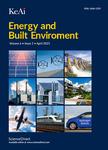Digital twin technology for thermal comfort and energy efficiency in buildings:A state-of-the-art and future directions
作者机构:Department of Civil engineeringMonash University ClaytonVIC 3800Australia
出 版 物:《Energy and Built Environment》 (能源与人工环境(英文))
年 卷 期:2024年第5卷第5期
页 面:641-656页
核心收录:
学科分类:12[管理学] 1201[管理学-管理科学与工程(可授管理学、工学学位)]
基 金:Monash University MU
主 题:Buildings Digital twin Thermal comfort Energy consumption Scientometric review
摘 要:In recent years,the integration of digital technologies has grown rapidly in the field of thermal comfort and energy efficiency for *** concept of a digital twin,incorporating multiple digital technologies,has gained increasing *** literature lacks a review of the digital twin concept in thermal comfort and energy consumption for existing *** paper conducts a review of the current state-of-the-art in digital twin(DT)technology for thermal comfort/energy consumption in *** review employs a scientometric approach and examines various technologies used in creating DTs and a systematic analysis of the methods,technologies,algorithms,and approaches used in digital twin *** results show a growing number of studies in this area,with a focus on thermal comfort monitoring,visualization,tracking,energy management,prediction,and optimization for existing ***,the prediction of energy consumption using algorithms such as Artificial Neural Networks(ANN),Artificial Intelligence(AI),deep neural networks,and YOLOv4 have been used in ***,the wider adoption of a DT that can facilitate occupants,and thermal sensations,enhance human-centered solutions,and improve energy prediction levels are *** is a need for further international collaboration to expand the studies on digital twins for thermal comfort and energy *** review highlights the limitations and areas of improvement,such as the limited adoption of sensors for environmental measures,the need for more focus on the subjective perception of occupants,and the need for more comparative studies of algorithms for predicting energy *** studies can be conducted in areas such as understanding occupant psychological responses/behaviors to comfort in the digital *** will enhance a more consolidated and robust validation for building performance.



